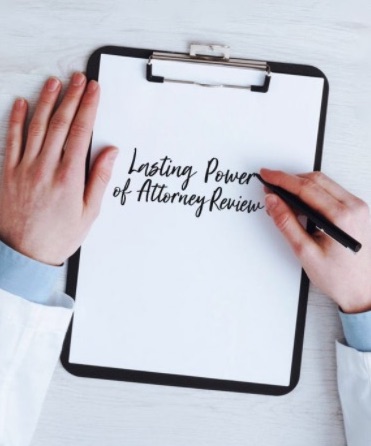Lasting Power of Attorney: A quick guide
A document where you can appoint someone in case you lose mental capacity.
 Many people are familiar with a Will – it contains instructions to their loved ones on managing their affairs upon death. But what if you lose mental capacity one day, and cannot make decisions or manage your affairs by yourself?
Many people are familiar with a Will – it contains instructions to their loved ones on managing their affairs upon death. But what if you lose mental capacity one day, and cannot make decisions or manage your affairs by yourself?
You risk having your financial assets frozen, since your loved ones cannot access them without your consent. Various institutions may also not recognise decisions your loved ones make for you, causing them unnecessary frustration and hardship.
To act on your behalf, your loved ones will have to apply for deputyship through the courts – an expensive and tedious process. Furthermore, you have no say in who becomes your deputy.
Are there other alternatives for you and your loved ones? This is where the Lasting Power of Attorney (LPA) comes in.
What is an LPA?
An LPA is a legal document which allows a person (donor) who is at least 21 years old to appoint one or more persons (donees) to make decisions and act on his or her behalf should he or she lose mental capacity.
By creating one, your donee(s) can manage your affairs for you immediately without applying for deputyship. Compared to appointing a deputy, applying for an LPA is less tedious and costly.
Things to consider
- Which LPA form to choose
You can choose between two forms when creating an LPA: Form 1 or Form 2. Your choice depends on your needs.
LPA Form 1 vs Form 2
| LPA Form 1 (For standard needs) |
LPA Form 2 (For complex needs) |
|
| Powers Granted | Grants a broad range of powers with basic restrictions to your donee(s) to fully act in your best interests, subjected to the Mental Capacity Act. | Customisable, but subjected to the Mental Capacity Act. |
| Who Can Witness and Certify | Accredited medical professionals, registered psychiatrists and lawyers. | Lawyers only. |
| Number of Donees | Up to two donees and one replacement donee. | No limit. |
| Application Fee to OPG | S$75 for Singaporeans (waived till August 31, 2020, excludes professional fees from certificate issuers).
|
S$200 for Singaporeans (excludes professional fees from certificate issuers). |
Source: Office of Public Guardian
- Number of donees appointed
You are required to appoint at least a donee who is 21 years old and above, and not an undischarged bankrupt. Make sure your donee(s) is trustworthy and competent enough to act in your best interests, and is willing to take on the responsibility of doing so.
- Decisions your donee(s) can make
Your donee(s) can act in two broad areas:
- Personal welfare – This includes your daily needs, such as your accommodations, whom you have contact with, and your care.
- Property & affairs – This includes decisions regarding your personal finances, managing your bank account(s), property and other assets.
You can specify if your donee(s) can make decisions in either or both areas.
- Scope of powers granted to donee(s)
If you have multiple donees and allowed them to make decisions in the same areas, you can indicate if the decisions are to be made jointly (the donees must act together), or jointly and severally (the donees can either act on their own or together). If you did not indicate your preference, the law will assume your donees will act jointly.
- Any replacement donees
If your donee(s) are unable to act for you for reasons stated in the Mental Capacity Act, a replacement donee(s) can immediately take over his or her duties.
You should discuss these arrangements with your donee(s) and your loved ones, so everyone is aware of your donee(s)’ responsibilities. This way, they can work together to protect your interests should you lose mental capacity.
- Selecting a certificate issuer for your LPA
There are several certificate issuers to select from, depending on which LPA form you chose. Here’s a quick guide to help you decide:
| Certificate issuer | When to engage | Which form they can witness & certify |
| Accredited medical professionals* | Suitable for those who fully understand the risks and obligations of creating an LPA and have no legal questions. | LPA Form 1 |
| Registered psychiatrists* | Suitable for those with fluctuating mental capacity, possible or diagnosed mental health issues, or in the early stage of dementia.
In the situation where someone challenges that you lacked the mental capacity to create an LPA, the psychiatrist can ascertain your mental capacity at the point when you signed it. |
|
| Lawyers | Suitable for those who need legal advice about creating an LPA, or wish to grant customised powers to their donee(s). | LPA Forms 1 and 2 |
* Medical professionals and psychiatrists will not be able to provide legal advice.
What’s next?
Life is unpredictable. We don’t know when an accident may befall us, robbing us of our mental capacity.
It’s never too early safeguard yourself against any mishaps or illnesses that may take away your mental capacity. Creating an LPA is relatively hassle-free. You will also be assured that someone you trust can immediately manage your affairs and make decisions on your behalf.
(** The above article has been provided by Raffles Health, a subsidiary of Raffles Medical Group. Raffles Medical Group offers a panel of doctors who are LPA certificate issuers. The article first appeared on Raffles Health and was modified for Ageless Online. To see the full article, go HERE.)
(** PHOTO CREDIT: Raffles Health)

0 Comments